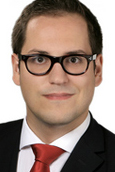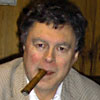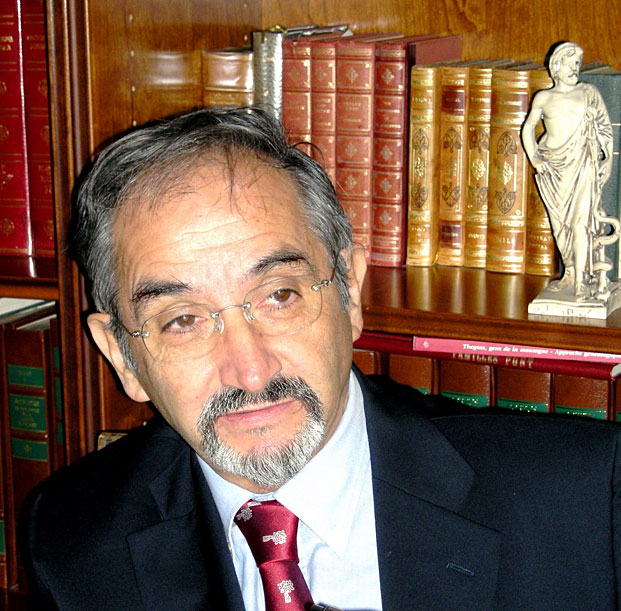Frederik Cyrus Roeder

Frederik Roeder is a German health economist. He studied hospital management, health economics and international business at the universities of Goettingen (Germany), Bayreuth (Germany), Maribor (Slovenia), and Tongji Shanghai (China). He has worked as a Visiting Professor for Health Economics at the Lithuanian University of Health Sciences and as a Visiting Professor for Healthcare Management and Economics at Ilia State University (Georgia). Fred Roeder is the Managing Director of Healthcare Solutions, a service focused on know-how transfer and policy advise for healthcare systems in transition.
Michael Schlander
Professor Michael Schlander MD, PhD, MBA is a health economist at the University of Heidelberg and a professor of health care and innovation management at the University of Applied Economic Sciences, Ludwigshafen. He is the founder and scientific director of the Institute for Innovation and Valuation in Health Care (Inno Val HC) a not for profit institute based in Eschborn, Germany. Professor Schlander who is also a physician has written ground-breaking studies on the role and limits of current evaluation methodology in adminstrative assessments of medical innovation.
Nicoleta Acatrinei
Graduate in economics and in theology, Nicoleta is currently preparing a PhD at the Swiss Federal Polytechnicum (ETH) in Zurich. She has spoken and written on topics related to ethics, economy and theology in Switzerland, China, Denmark and others. She is the author of "St Jean Chrysostome et l'Homo Oeconomicus" a scholarly work that explores the theological roots of market ethics. She has joined Medicine & Liberty in 2009 as our research fellow in charge of Ethics in Economics.
Francis Thevoz
Dr Francis Thevoz is a Cardiovascular surgeon by training. Past-president of the Société Vaudoise de Médecine he is also a former councilor of the City of Lausanne where he served as Director of finances. He is currently a member of the finance commision of the city's parliament. Francis will notably participate in the development of MedLib's, Privamed-Pro project.
Sophie Crespo
Sophie Crespo MD, our special projects & editorial consultant based in Geneva, graduated from Basel University Medical School. She holds specialist titles in intern al medicine and anesthesiology.
Contact: sophiecrespomd@medlib.ch
Fabienne Gay-Crosier
Dr Fabienne Gay-Crosier, joined MedLib's Medical Advisory Council in 2014. She is past president of the professional policy commisssion at the Swiss Society of Clinical Allergology and Immunology and is a firm advocate of professional independence for physicians. Author of "Geneva's White Paper on Allergy" Fillon Impr. Oct. 2015.
Loredana D'Amato Sizonenko MD
Dr D'Amato Sizonenko is a geneticist specialized in rare diseases. She is presently Coordinator for Switzerland of Orphanet, an international database of information on rare diseases and orphan drugs for all publics, designed to contribute to the improvement of the diagnosis, care and treatment of patients with rare diseases.
Martín Krause
Martin Krause is the diirector of the Centro de Investigations de instituciones y Mercados de Argentina: professor of Economics at the University of Buenos Aires.
Philip Stevens
Philip Stevens, Director of Policy at International Policy Network, London is the author of numerous health policy publications, including Fighting the diseases of Poverty (2007), Free trade for better health (2006) and The 10/90 Gap and the diseases of poverty (2004). He has also held research positions at the Adam Smith Institute and Reform in London and holds degrees from the London School of Economics and Durham University.
Shahnaz Radjy
After graduating in Biology at UPenn in Philadelphia, Ms Shahnaz Radjy was active in humanitarian action in Bolivian hospitals, and founded an A-TIC internet venture in Bolivia. She has also organized events for the International Labor Organization in Geneva and worked for the Davos World Economic Forum. Shahnaz is now based in NY and works as senior communications specialist for Vitality.
Bart Madden
Bartley Madden is an independent researcher who has developed "Dual Tracking": a fast lane for access to experimetal medicines, that also introduces an open database on new therapies. Bart Maddens concept is supported by Vernon Smith, Nobel prize in economics 2002 and by other reputed US economists. He has authored a monograph: "Dual Tracking, More Choices Better Health" edited by the Heartland Institute, Chicago.
Stefan Metzeler
Graduate from the Ecole Polytechnique Fédéerale de Lausanne (EPFL). Information and technology specialist, owner at Amadeus IT solutions. Swiss representative fo the International Society for Individual Liberty ISIL.
Contact: smetzeler@medlib.ch
Pierre Bessard
Executive Director of the Institut Constant de Rebecque, Lausanne, and President of the Liberales Institut, Zurich
Henri Siegenthaler
President of the Swiss Society for the Independence of medicine and editor in chief of « Der Arzt und sein Patient / Le Médecin et son Patient » Journal. Author of "Serons nous tous euthanasiés?" Ed.Cabedita (2015).
Pierre Lemieux

Professor of economics at the University of Québec in Outaouais. Author of "Le Droit de porter des armes"(1993), "Comprendre l'économie (2008) and other works such as "Public Health Insurance under a Non Benevolent State". Editor of Liberty in Canada online tribune.
Georges Lane
Georges Lane is a Professor of economics at the University of Paris-Dauphine where he teaches insurance economics.
Philip Stevens
Philip Stevens, Director of Policy
Philip is the author of numerous health policy publications, including Fighting the diseases of Poverty (2007), Free trade for better health (2006) and The 10/90 Gap and the diseases of poverty (2004). His writings on health policy have appeared in a wide range of international newspapers. Philip has also held research positions at the Adam Smith Institute and Reform in London, and spent several years as a management consultant. He holds degrees from the London School of Economics and Durham University.
Ernest Truffer
Swiss ENT surgeon and medical philosopher. One of the founding members of IATROS, a world organization of private and independent physicians. Writes regularly on medical ethics and other issues in various medical journals and in his blog.
Ernest unfortunately passed away on March 11th, 2015 and wil be deeply regretted by all those who knew him. The founding principles of Medicine and Liberty were strongly influenced by his profound understanding of the medical mission and his uncompromising attachment to Hippocratic ethics.
Gabriel Calzada
Professor of economics at the Universidad Rey Juan Carlos, Madrid. Founder of Medicina en Libertad (MedLib.es) and of Madrid's Instituto Juan de Mariana.
Gabriel is president of Francisco Marroquin University in Guatemala and member of the presidential board of the prestigious Mont Pelerin Society
Victoria Curzon Price
Professor of economics at the University of Geneva. President of Institut Constant de Rebecque, Lausanne. Member of Geneva Parlliament. Past president of the Mont Pelerin Society.
Rudolf Mayer
A practicing Opthalmologist in Lausanne. Active in Swiss medical professional politics he is a staunch defender of medical autonomy. He is on the editorial board of the Swiss medical journal "Arzt un Patient" (Physician and Patient)
Alphonse Crespo
Alphonse Crespo founder and executive director of Medicine and Liberty. Swiss orthopedic surgeon, author of Esculape Foudroyé (Les Belles Lettres 1991), ISBN 2-251-39008-1 and of numerous essays and articles such as Black Market Medicine an Ethical alternative to State Control, Outlawing Medicine or The End of Welfare and its effect on the Poor. President of the Cercle de philosophie politique Benjamin Constant at the Institut Libéral a Swiss think tank founded in 1979. Also conducts Med-Consilium a Swiss accident insurance consulting & assessment independent service.
Serban Sichitiu
Reputed paediatrician practicing in Lausanne. He was one of the founders of Switzerland's Patient and Physician Union active in the defense of patient and phyisician rights and liberties.
Medicine & Liberty
Sentier de la Tour-Carrée 9
CH-1800 Vevey - Switzerland
Tel & fax: 41 21 922 60 82
info@medlib.ch
Hippocratic Morality versus Medical Ethics
Despite what many people think, Hippocratic morality and medical ethics are two distinct concepts that are only remotely related.
Hippocratism is a civilizing and humanist professional philosophy that places the individual at the center of its concerns. Conversely what we now call medical ethics is but a set of rules that puts medicine at the service of power.
Hippocratism is a civilizing and
humanist professional philosophy that places the individual at the
center of its concerns. Conversely what we now call medical ethics is no
more than a set of rules that puts medicine at the subservience of
power. This is
achieved through countless bureaucratic "multidisciplinary ethics
committees" # spawned by a so called “right to health” (positive law)
resulting from a new gospel, that of Human Rights (1947).
Hippocratic ethics prohibits abortion whereas medical ethics accepts it
and and even promotes it. (10,848 abortions were reported in Switzerland
in 2008 according to the Swiss federal office of health) Not to mention
euthanasia in retirment homes or scientific diddling with embryos. All
with the blessing of the State, of its lobbies and its ethical proxies!
It is quite clear that the only connection between Hippocratic morality
and modern medical ethics results from gross missapropriation.
Contemporary medicine has become a mere tool of any ar all forms of
power as demonstrated in the former USSR (psychiatry), in some Islamic
countries (hand cutting surgeons), or in Nazi Germany (concentration
camps) etc. In practice medical ethics will mold to whatever shape that
political power chooses.
Indeed medicine has become the tool of power. Besides, whenever
government is unable to solve a specific problem, it turns it into a
medical problem (courts, army, prisons, etc.). Ethics committees readily
accept the thwarted mission endowed upon them by power and will condone
in the name of the medical profession, deeds contrary to the
Hippocratic morality.
It can be legitimately suspected that medical ethics has become an
essential element of the "totalitarisation" of society and its return to
barbarism. It is therefore essential that physicians become aware of
the difference and opposition between Hippocratic morality and what is
brandished as medical ethics. In other words the difference betweeen
Hippocrates and Tschudi*
Ernest Truffer MD , Sierre 14/11/2010 -
(Translated & edited by Alphonse Crespo)
* Editor’s note : Hans Tschudi was the initiator of socialist reforms of
Swiss Healthcare in the 1960’s in the same way as Lyndon Johnson &
Barak Obama would later put American Health care on the same
collectivistic & statist path
February 19, 2011

 RSS feed
RSS feed